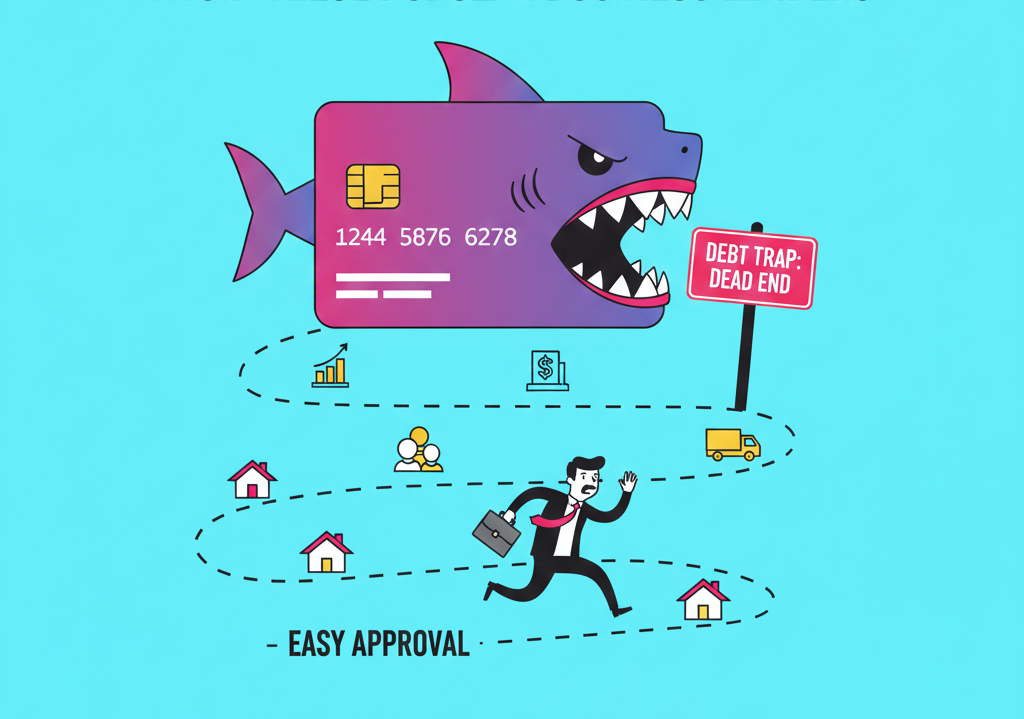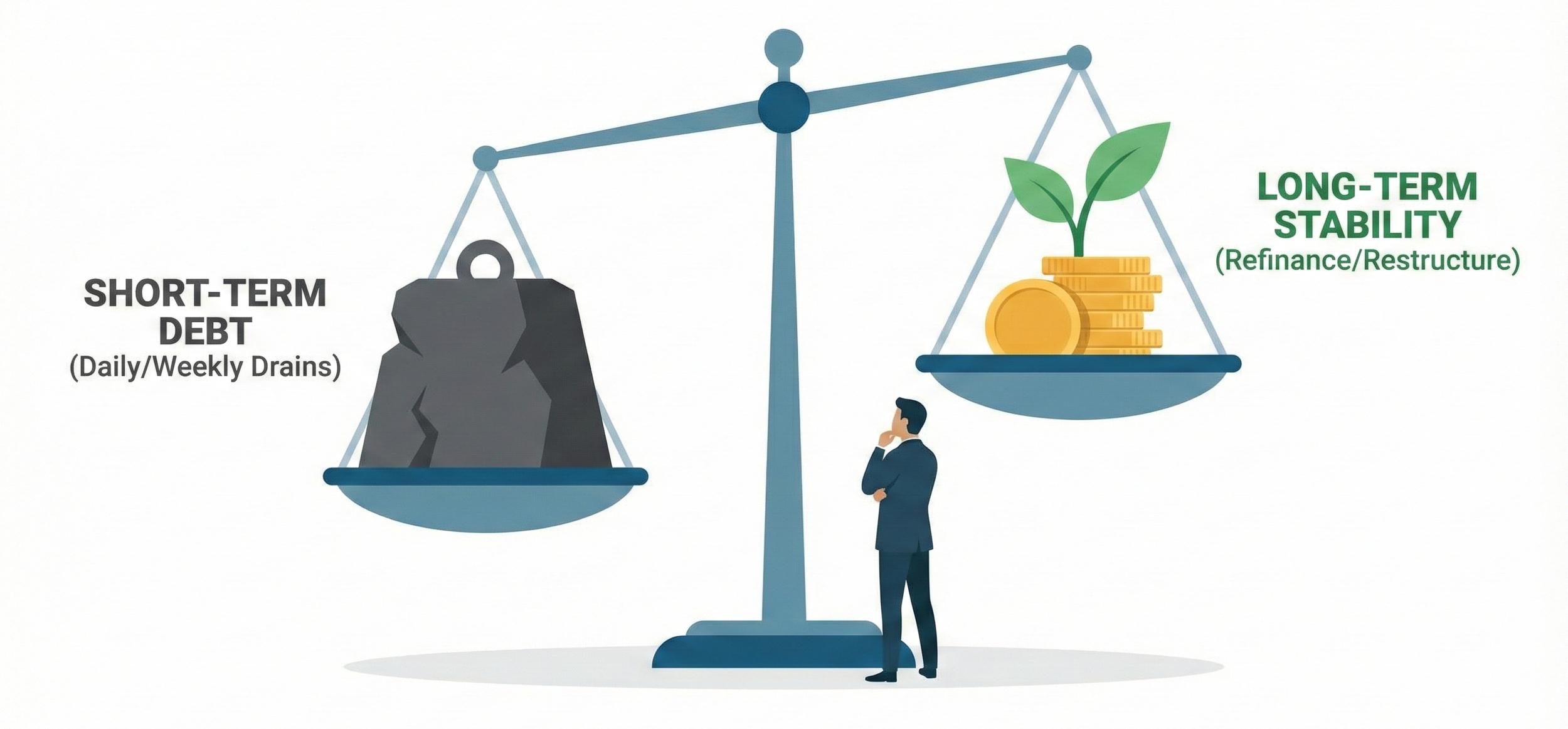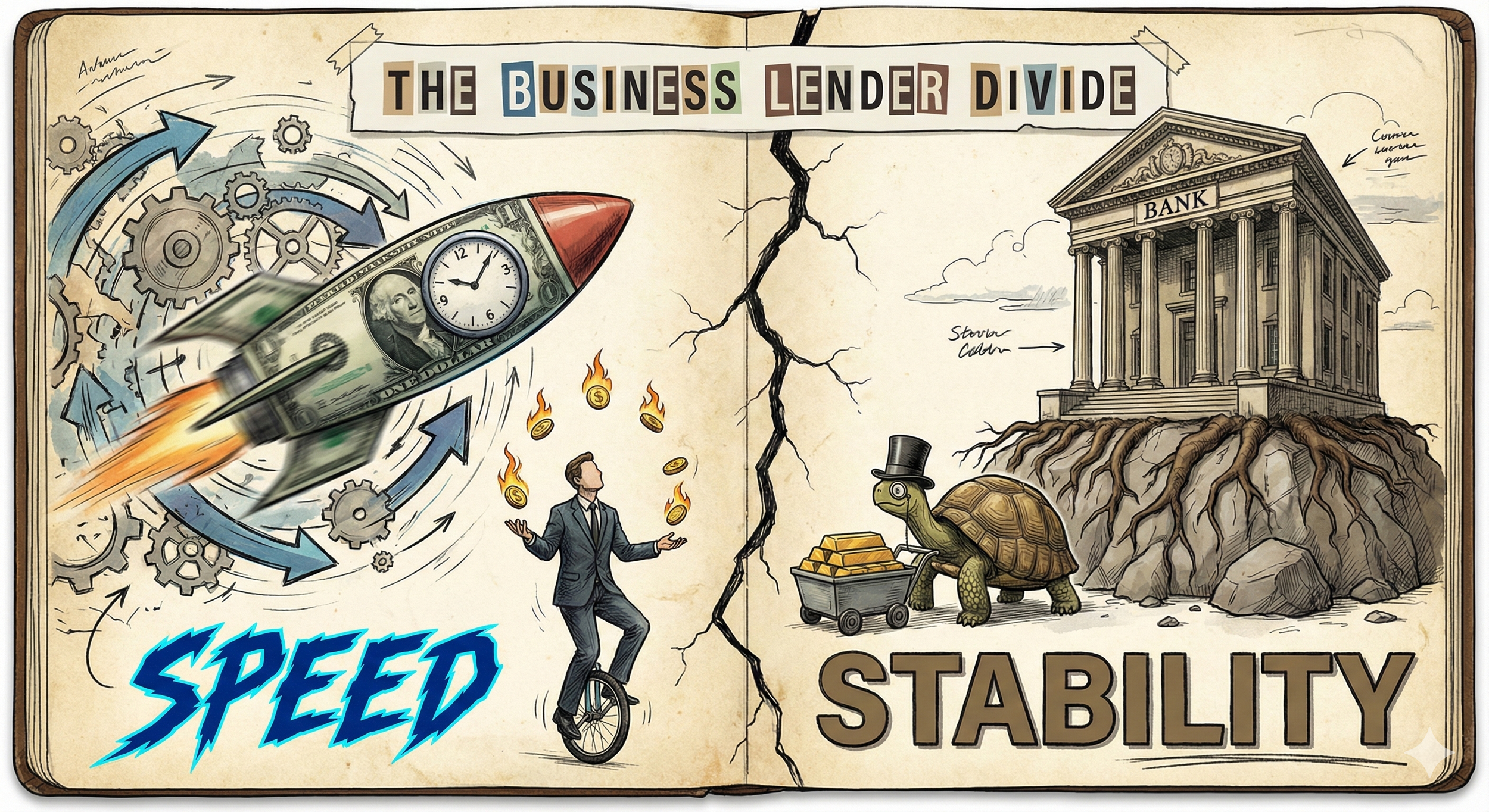“The last 10% it takes to launch something takes as much energy as the first 90%.“
—Rob Kalin, Etsy founder
General Requirements (takes about 5-minutes or less to apply online)
680+ FICO score (Transunion or Experian FICO model 8.0 or similar)
Less than 15% operating loss in the last year of business
Last 2-Years of filed Business Tax Returns; Last 1-Year of filed Personal Tax Returns
Last 3-months of bank statements; copy of Driver’s License
Unlocking Business Growth: Could a Performance-Based Consultant Be Your Lifeline?
Running a small business is a journey of passion, grit, and relentless hard work.
You've poured your heart, soul, and likely a significant amount of your savings into building something from the ground up.
But what happens when the trajectory flattens, sales stagnate, or the challenges of scaling seem insurmountable?
Many small business owners find themselves in this precarious position, wearing too many hats, feeling overwhelmed, and unsure of the next best step.
Cash flow might be tight, making the thought of hiring expensive traditional consultants or full-time senior staff an impossible dream.
If this sounds familiar, you're not alone. And more importantly, there are innovative solutions that can provide the high-level expertise you desperately need without the upfront financial burden.
Enter the world of performance-based consulting: specifically, consult-for-revenue-share and consult-for-equity agreements.
These aren't just fancy terms; they represent a powerful way to bring a seasoned expert into your corner, deeply invested in your success because their compensation is directly tied to it.
This article will delve into what these agreements are, how they can be a game-changer for struggling or stagnant businesses, the typical structure and duration of such engagements, and how they can serve as a crucial incubation period for potential future equity investment.
The Familiar Struggles of a Small Business Owner
Before we explore the solutions, let's acknowledge the common pain points:
● Cash Flow Crunches: This is often the biggest elephant in the room. You know you need help, but payroll, inventory, marketing expenses, and operational costs already stretch your budget thin. The idea of a hefty monthly retainer for a consultant is simply off the table.
● Expertise Gaps: As an owner, you're likely a jack-of-all-trades, but perhaps a master of only a few. You might excel at product development but struggle with sales and marketing. Or perhaps your operations are sound, but your financial strategy is weak. Identifying and filling these expertise gaps is critical for growth.
● Stagnation and Lack of Fresh Perspectives: When you're deep in the daily grind, it's hard to see the forest for the trees. Strategies that once worked may no longer be effective. An outside perspective can be invaluable in identifying new opportunities or diagnosing hidden problems.
● Overwhelm and Burnout: Trying to do everything yourself leads to exhaustion and can stifle creativity and strategic thinking. Delegating to an expert who can take ownership of a critical area can free you up to focus on what you do best.
● Fear of Risk: Committing to large fixed costs in an uncertain environment is daunting. You need solutions that minimize upfront risk while maximizing potential upside.
If these challenges resonate, then understanding performance-based consulting is not just an academic exercise—it could be the key to unlocking your business's latent potential.
What is a Consult-for-Revenue-Share Agreement?
A consult-for-revenue-share agreement is a contractual arrangement where a consultant provides their expertise and services to your business in exchange for a percentage of your company's future revenue.
Instead of a fixed fee or hourly rate, the consultant's earnings are directly linked to the top-line growth they help generate.
How it Typically Works—
1. Identification of Need: You and the consultant identify a specific area where their expertise can directly impact revenue (e.g., sales strategy, marketing campaigns, new product launch, market expansion).
2. Defining the Scope: A clear Scope of Work (SOW) is crucial. What exactly will the consultant do? What are their responsibilities and deliverables?
3. Agreeing on the Percentage: The revenue share percentage is negotiated. This can vary widely based on the industry, the scope of work, the baseline revenue, and the consultant's typical rates. It might be a percentage of all revenue, or more commonly, a percentage of the increase in revenue above an agreed-upon baseline. For example, if your current monthly revenue is $50,000, the agreement might state the consultant earns 10% of all revenue generated above $50,000 each month.
4. Setting a Baseline (If Applicable): Establishing a clear, pre-engagement revenue baseline is vital if the share is based on growth. This requires transparent access to financial records.
5. Defining "Revenue": It's important to clearly define what constitutes "revenue" for the purpose of the agreement. Is it gross revenue, net revenue after certain deductions (like returns or specific costs of goods sold)? Precision here prevents future disputes.
6. Duration and Review: These agreements typically have a defined term, often with review points.1
7. Payment Terms: How and when will the revenue share be calculated and paid out (e.g., monthly, quarterly)?
Benefits for the Struggling Small Business
● Minimized Upfront Cost: This is the most significant advantage. You gain access to high-caliber expertise without draining your precious cash reserves on retainers or salaries.
● Aligned Incentives: The consultant is highly motivated to achieve tangible results because their income depends on it. They are literally invested in your top-line growth. This "skin in the game" mentality can lead to more dedicated and creative problem-solving.
● Focus on Results: The entire engagement is geared towards generating revenue. This sharpens the focus for both you and the consultant, cutting through activities that don't contribute to the bottom line.
● Access to Specialized Skills: You can bring in a specialist for a critical period to supercharge an area like digital marketing, sales process optimization, or strategic partnerships – areas where you might lack in-house strength.
● Reduced Risk: If the consultant's strategies don't generate the expected revenue, your direct financial outlay to them is minimal or zero. The primary risk you bear is the opportunity cost of time, but not a large fixed fee.
Considerations for Revenue-Share Agreements
● Defining "Attributable Revenue": It can sometimes be challenging to directly attribute all revenue growth solely to the consultant's efforts, especially if multiple initiatives are running concurrently. Clear definitions and metrics are key.
● Trust and Transparency: You'll need to be comfortable sharing financial data with the consultant. A strong foundation of trust is essential.
● Potential for High Payouts: If the consultant is exceptionally successful and revenue skyrockets, their percentage share could translate into a significant sum—potentially more than you might have paid a traditional consultant. However, this is a "good problem to have" as it means your business is thriving.
● Scope Creep: Ensure the SOW is tight. As the relationship evolves, it's easy for the consultant to be pulled into areas outside the original agreement. Regular check-ins can manage this.
What is a Consult-for-Equity Agreement?
A consult-for-equity agreement takes the partnership a step further.
In this model, the consultant provides their services in exchange for a stake (equity) in your company. Instead of cash, their compensation is a piece of the business itself.
How it Typically Works:
1. Valuation Discussion: This is often the trickiest part. An early-stage or struggling business can be difficult to valuate. Both parties need to agree on a current valuation or a mechanism for determining the value of the equity to be granted. Sometimes, this involves warrants or options that vest over time or upon achievement of specific milestones.
2. Equity Percentage and Vesting: The amount of equity offered will depend on the consultant's experience, the perceived value of their contribution, the stage of your business, and the duration and intensity of the engagement. Equity is almost always subject to a vesting schedule, meaning the consultant doesn't receive it all upfront. It's earned over time (e.g., a 1-2 year vesting period with a "cliff" – a minimum period, often 6 months to a year, before any equity vests). This protects the business if the consultant departs early or doesn't perform.
3. Scope of Work: As with revenue-share, a detailed SOW is critical. What strategic input, operational changes, or market connections will the consultant provide?
4. Milestones: Equity grants can be tied to the achievement of specific, measurable milestones (e.g., securing a certain level of funding, launching a new product line successfully, achieving a specific user acquisition target).
5. Legal Framework: These agreements are more complex than revenue-share deals and require careful legal structuring. This includes shareholder agreements, understanding dilution for existing owners, and clarifying rights and responsibilities.
Benefits for the Struggling Small Business
● No Cash Outlay: Similar to revenue-share, this conserves cash. This is particularly attractive for businesses that are pre-revenue or have very tight margins but high growth potential.
● Deeply Vested Partner: A consultant with equity has the ultimate "skin in the game." Their success is inextricably linked to the long-term success and value of your entire business, not just short-term revenue. This encourages a holistic, strategic approach.
● Long-Term Perspective: Equity consultants are often interested in helping build lasting value. They may bring a broader strategic vision and a network that can be beneficial for years to come.
● Attracting Top Talent: Highly experienced individuals, who might be too expensive to hire as employees or traditional consultants, may be attracted by the potential upside of an equity stake in a promising company.
● Credibility Boost: Having a respected expert take equity can sometimes enhance your company's credibility with investors, partners, and even customers.
General Requirements (takes about 5-minutes or less to apply online)
680+ FICO score (Transunion or Experian FICO model 8.0 or similar)
Less than 15% operating loss in the last year of business
Last 2-Years of filed Business Tax Returns; Last 1-Year of filed Personal Tax Returns
Last 3-months of bank statements; copy of Driver’s License
Considerations for Equity-Share Agreements
● Dilution: Giving away equity means you own a smaller percentage of your company. You need to be comfortable with this and understand the long-term implications.
● Valuation Challenges: Agreeing on a fair valuation can be contentious, especially if the business isn't generating substantial revenue or profits yet.
● Long-Term Commitment: An equity partner is, in a sense, a business partner. You're entering into a long-term relationship. Ensure your vision, values, and working styles are compatible.
● Complexity: These agreements require more sophisticated legal and financial advice to set up correctly.
● Defining the Exit: What happens if the relationship doesn't work out? Are there buy-back provisions? What if the company is acquired? These scenarios need to be considered.
How Expertise Can Transform Your Business
Whether through revenue-share or equity, the core benefit lies in injecting targeted expertise into your business at a critical juncture.
A seasoned consultant or advisor brings more than just a list of services; they bring:
1. A Fresh, Objective Perspective: Business owners are often too close to their operations to see underlying issues or emerging opportunities. An external consultant can provide an unbiased assessment, challenging assumptions and identifying blind spots. They haven't been living and breathing your company's history, so they can ask the "obvious" questions that might unlock new insights.
2. Specialized Skills and Knowledge:
○ Marketing & Sales: Perhaps your product is great, but you don't know how to reach your target audience effectively, or your sales process is inefficient. A consultant can revamp your digital marketing strategy, build a high-performing sales funnel, or train your team.
○ Operations & Efficiency: If your costs are too high, your processes are clunky, or you're struggling to scale, an operations expert can streamline workflows, implement new technologies, and optimize your supply chain.
○ Finance & Strategy: A financial consultant can help you understand your numbers deeply, develop robust financial models, prepare for fundraising, or devise a sustainable growth strategy.
○ Technology & Digital Transformation: In today's world, technology is often a key differentiator. A tech consultant can help you leverage the right tools, develop digital products, or improve your online presence.
3. Strategic Focus and Prioritization: When you're pulled in multiple directions, it's easy to lose sight of your core strategy. A consultant can help you clarify your vision, set realistic goals, and prioritize initiatives that will have the greatest impact. They act as a strategic sounding board.
4. Access to Networks and Resources: Experienced consultants often have extensive professional networks. They might connect you with potential clients, strategic partners, suppliers, investors, or even key hires that you wouldn't be able to access on your own.
5. Accountability and Execution Support: It's one thing to have a plan; it's another to execute it effectively. A good consultant doesn't just deliver a report and walk away. In a performance-based model, they are motivated to see the plan through to execution, providing guidance and holding your team (and you) accountable for achieving the agreed-upon milestones.
6. Mentorship and Skill Transfer: Beyond direct problem-solving, a consultant can mentor you and your team, transferring valuable skills and knowledge that will benefit your business long after the engagement ends. This upskilling of your internal capabilities is a significant, often overlooked, benefit.
For a struggling company, this infusion of focused expertise can mean the difference between gradually fading away and pivoting towards a new growth trajectory.
It’s about bringing in a temporary "special forces" unit to tackle a critical mission that your current team isn't equipped to handle alone.
The Typical Timeline:
6 Months to 2 Years – An Incubation Period
One of the defining characteristics of these performance-based consulting agreements is their typical duration.
Most agreements are structured for a minimum of six months and generally last less than two years.
There are sound reasons for this timeframe:
● Minimum Six Months: Laying the Foundation and Seeing Initial Results
○ Learning Curve: It takes time for a consultant to truly understand your business, its unique challenges, culture, and market position. The first month or two often involve deep dives, data analysis, and strategy formulation.
○ Implementation: Implementing new strategies, processes, or marketing campaigns doesn't happen overnight. Whether it's building a sales pipeline, launching a new website, or optimizing operations, these initiatives require time to roll out.
○ Lag Time for Results: There's often a lag between implementing changes and seeing tangible results, especially in revenue. For example, a new SEO strategy might take 3-6 months to show significant improvements in search rankings and organic traffic. A revamped sales process needs time for leads to move through the funnel.
○ Building Trust and Rapport: A strong working relationship between the business owner and the consultant is vital. Six months provides a reasonable period to build this trust and establish effective communication and collaboration patterns.
An engagement shorter than six months often doesn't provide enough runway for the consultant to make a meaningful, measurable impact, especially one that's tied to revenue or long-term value creation.
● Typically Less Than Two Years: Focused Impact and Avoiding Entanglement
○ Maintaining Focus: Longer engagements can sometimes lose focus or momentum. A 12-to-18-month timeframe often provides a sweet spot for achieving significant objectives without the relationship becoming stale or the consultant becoming an indefinite fixture.
○ Clear Objectives and Milestones: The sub-two-year duration encourages the setting of clear, achievable objectives within that period. It forces both parties to be realistic about what can be accomplished.
○ Defined "End" or Review Point: These agreements are not meant to be permanent solutions. They are designed to address specific challenges or unlock specific opportunities. Having a defined endpoint (or a significant review point where continuation is actively decided) ensures that the engagement's value is regularly assessed.
○ Transition and Handover: Part of a successful consultancy is ensuring that the improvements are sustainable after the consultant departs. The latter part of the engagement often involves training internal staff and embedding new processes so the business can continue to benefit.
○ Evolving Needs: A business's needs can change rapidly. What you need help with today might be different two years from now. Shorter, focused engagements allow for more flexibility to bring in different types of expertise as required.
General Requirements (takes about 5-minutes or less to apply online)
680+ FICO score (Transunion or Experian FICO model 8.0 or similar)
Less than 15% operating loss in the last year of business
Last 2-Years of filed Business Tax Returns; Last 1-Year of filed Personal Tax Returns
Last 3-months of bank statements; copy of Driver’s License
Structuring the Agreement for Success
Regardless of whether you opt for revenue-share or equity, the success of the engagement hinges on a well-structured agreement.
Key elements include:
● Crystal-Clear Scope of Work (SOW):
○ What specific problems will the consultant address?
○ What are their precise responsibilities and deliverables?
○ What activities are explicitly out of scope?
○ Define key performance indicators (KPIs) that will measure progress and success. These must be quantifiable.
● Detailed Metrics and Calculations:
○ For Revenue-Share: How is "revenue" defined (gross, net, specific product lines)? What is the exact percentage? Is there a baseline? How and when will calculations and payments be made? What happens if revenue declines?
○ For Equity: What is the valuation basis? How much equity? What is the vesting schedule (cliff, monthly/quarterly vesting)? Are there performance triggers for vesting? What class of shares (e.g., common, preferred, non-voting)?
● Duration and Termination Clauses:
○ Specify the start and end date of the agreement.
○ Include conditions under which either party can terminate the agreement (e.g., breach of contract, failure to meet minimum performance thresholds, change in business ownership).
○ What happens to vested/unvested equity or accrued revenue share upon termination?
● Reporting and Communication:
○ Establish a regular cadence for meetings, progress reports, and data sharing. Transparency is paramount.
● Confidentiality and Non-Disclosure (NDA): Protect your sensitive business information.
● Intellectual Property (IP): Who owns any IP created during the engagement? Typically, work done for the company is owned by the company, but this should be explicit.
● Dispute Resolution: Outline a process for resolving disagreements (e.g., mediation, arbitration).
● Legal Review: Crucially, both parties should have independent legal counsel review any such agreement before signing. This is not a place to skimp. The cost of good legal advice upfront is far less than the cost of a poorly drafted agreement leading to disputes later.
Choosing the Right Model and the Right Partner
When is Revenue-Share Often Better?
● When the impact on revenue can be clearly and directly measured (e.g., a sales consultant, a digital marketing campaign specialist).
● For shorter-term, highly focused projects aimed at boosting top-line growth quickly.
● When the business is hesitant to dilute ownership but can afford to share a portion of increased revenue.
● When the primary need is tactical execution in a revenue-generating function.
When is Equity Often Better?
● For longer-term, strategic advisory roles that impact the overall direction and value of the company (e.g., a fractional CFO, a strategic advisor helping with a major pivot or market entry).
● When the business has high growth potential but is pre-revenue or has very limited cash flow.
● When seeking a deeply committed partner for a significant transformation or turnaround.
● When the consultant's contribution is foundational to building long-term enterprise value, rather than just immediate sales.
Finding the Right Consultant—
● Track Record and References: Look for consultants with proven experience relevant to your industry and your specific challenges. Ask for case studies and speak to their former clients.
● Cultural Fit: This person will be working closely with you and potentially your team. Ensure their working style, communication approach, and values align with yours.
● Clarity and Transparency: A good consultant will be upfront about their process, how they measure success, and what they need from you. Beware of those who make grandiose promises without clear plans.
● Mutual Respect: The relationship should feel like a partnership, not a transaction.
● Specialization: Be wary of "generalists" who claim to fix everything. Look for specialists in the areas where you need the most help.
Preparing Your Business for a
Performance-Based Consultant
To make the most of such an engagement, you need to do some prep work:
1. Honest Self-Assessment: Clearly identify your biggest challenges and the specific areas where you need help. What outcomes are you hoping for?
2. Data Organization: Be prepared to share relevant data – financials, sales figures, marketing analytics, operational metrics. The more information a consultant has, the better they can help. Ensure your books are in reasonable order.
3. Clear Goals: Define what success looks like for you. Is it a specific revenue target, a certain market share, a successful product launch?
4. Openness to Change: The consultant will likely recommend changes to how you do things. You must be receptive to new ideas and willing to implement them, even if they challenge your existing ways of working.
5. Commitment of Time: Even though the consultant is taking on a significant load, you and your team will still need to invest time in meetings, providing information, and collaborating on implementation.
A Path Forward When You're Stuck
Struggling in your small business doesn't mean you've failed. It often means you've reached the limit of your current resources or expertise.
Performance-based consulting, whether through revenue-share or equity, offers a dynamic and accessible way to bring in the high-level talent and strategic thinking you need to break through plateaus, navigate turnarounds, and unlock new avenues of growth.
These agreements align incentives, minimize your upfront financial risk, and can provide a vital injection of energy and expertise. The typical 6-month to 2-year duration makes them focused and results-oriented, and critically, serves as an ideal incubation period to test a deeper, long-term partnership that might include a significant equity investment.
If you're ready to explore new ways to revitalize your business, it's time to seriously consider whether a consult-for-revenue-share or consult-for-equity arrangement could be the strategic partnership that propels you forward.
Seek out experienced professionals, do your due diligence, get sound legal advice, and you might just find the lifeline your business needs to not only survive but thrive.
We can help you navigate through
the Small Business financing maze.The sooner you act, the more options you’ll have!
Schedule a consultation today and take the first step toward saving your business and your future.
Remember, more business debt isn’t the answer. A more effective business strategy is.
Click to setup an introduction meeting to discuss your situation and next best steps.
Bernarsky Advisors
Business Finance and Strategy Advice
Refinance. Restructure. Reorganize.
(See more of our articles about Business Finance and Strategy below…)
WHAT IS THE BEST AND SAFEST WAY FOR YOUR BUSINESS TO DEAL WITH HIGH BUSINESS DEBT PAYMENTS?
It is NOT by stopping ACH payments.
It is NOT by taking on another business loan.
It is NOT ALWAYS a Refinancing
It is NOT by entering into a debt settlement program.
Find out the BEST strategies to get your Business back to where it was



















